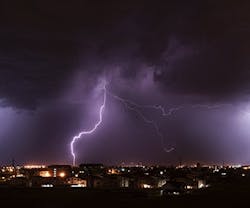Maintaining Gas Detection Systems During a Storm
Every part of the country is susceptible to some variety of severe weather. Tornados in the Midwest, hurricanes on the Gulf Coast and earthquakes in the Pacific, are all just a few of the examples of extreme weather patterns that could potentially lead to power outages, flooded or frozen equipment and combustible gas leaks.
While it is impossible to prevent inclement weather from happening, it is possible, however, to better prepare for it and keep your operations running as close to optimal levels. This is why Apollo Safety, providers of gas detection products and services for hospitals, universities, government operations, and other organizations throughout New England, devised the following safety recommendations to protect your building for extreme storms:
- Non-essential and combustible gas delivery systems should be shut down at the source and properly purged to avoid any release of a hazard should damage occur in the facility.
- All storage cylinders, containers, and vessels should be secured as per regulations.
- Should your facility’s gas detection system show alarm activity, including “Power Outage” or “Power Interruption” alarms, do not assume ANY alarm is false. Always follow your company emergency response policy.
Important to mention that all federal, state, local and a facility’s own regulations and requirements supersede these general recommendations.
“Gas detection systems are just as necessary as fire alarm systems. Gas detection systems alarm at the first sign of trouble,” says John V. Carvalho III, Apollo Safety’s president, who has been consulting with fire chiefs and building owners on gas detection and safety for more than two decades. “Toxic levels of commonly encountered gases such as hydrogen sulfide, carbon monoxide, nitric oxide, and nitrogen dioxide can harm workers even in low doses and can cause both short-term and long-term damage. Additionally, combustible gases such as methane, pentane, and hydrogen are serious hazards and when present in sufficient quantities, pose the threat of fire or explosion.”
The only way to detect if a gas detection system is working is to test it with the appropriate gases. Apollo Safety recommends that a gas detection expert should inspect, calibrate, and test a system on a regular schedule. By not having a routine maintenance system in place, the health and safety of everyone is at risk if the facility’s gas detection equipment is not functioning properly.
“It’s not enough just to have the gas/toxic leak detection systems in place,” Carvalho says. “It is imperative that these detection systems are maintained on a regular basis. Failing to properly maintain these systems will result in false alarms, inaccurate readings, or even worse, no alarms.”
